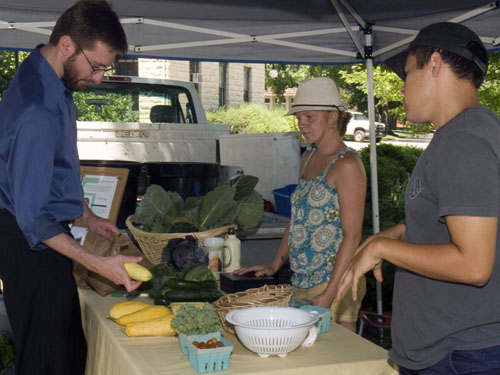|
|
Sources: Brandon Gonzalez, brandito@k-state.edu;
and Rhonda Janke, 785-532-0409, rrjanke@k-state.edu
Pronouncer: Janke is YON-kee
Photos available. Contact media@k-state.edu or 785-532-6415
Video available. Access at http://tinyurl.com/ntcrjh
News release prepared by: Kristin Hodges, 785-532-6415, khodges2@k-state.edu
Thursday, Sept. 24, 2009

K-STATE STUDENTS PRACTICE SUSTAINABLE AGRICULTURE TECHNIQUES AT STUDENT FARM BY GROWING AND SELLING PRODUCE, CONDUCTING INDEPENDENT RESEARCH PROJECTS
MANHATTAN -- Growing oyster mushrooms in recycled dorm lofts is one way that Kansas State University students are learning about sustainable farming practices through hands-on work and research projects at a K-State student farm.
Rhonda Janke, K-State associate professor of horticulture, teaches a course on sustainable agriculture and worked with students to start the Willow Lake Student Farm in fall 2007. She said the two-acre farm, which is at the Forestry Research Farm near Tuttle Creek Dam, is a place for students to develop skills and an understanding of sustainable farming practices through hands-on learning.
"This really all began with student initiative," Janke said. "They wanted a place to practice and to really do all the things we talk about in class. I just facilitate getting the grants and the logistics set up, and the students become the managers and decision-makers in terms of what we grow, how we sell it and other details."
The farm produces a variety of vegetables, fruit, mushrooms and honey and is run by students. Besides crop production, students also conduct independent research projects.
The co-managers of the farm are: Keith Unruh-Carey, senior in horticulture, 2005 graduate of Washington High School, Kansas City, Kan.; and Brandon Gonzalez, senior in horticulture, 2003 graduate of Wichita High School East. They are doing research on oyster and shiitake mushrooms for a project funded through a Kansas Department of Agriculture mushroom grant they wrote with Janke.
Gonzalez said mushrooms typically are grown in sterile conditions, but the students are working on growing the mushrooms outdoors at the student farm by using a more sustainable approach.
"Our approach is more sustainable than having to keep the mushrooms in an area that is sterile and temperature-set," he said. "It's also a lot cheaper. Someone that might want to add extra income for themselves can do it at home and not have to purchase a lot of extra items."
Unruh-Carey said the shiitake mushrooms are grown on logs; for the oyster mushrooms, the students have created a boxed structure from recycled dorm lofts with screens to keep bugs out.
"Most outdoor grows have pest problems during certain parts of the season, so we are physically excluding them," Unruh-Carey said. "It has worked pretty well so far, and it's a good setup for people who can't justify the expense of an indoor grow room."
Gonzalez said the students are studying the best variety and the best process to grow the mushrooms. Once it is established, they will teach others their growing process.
"The idea is that we are trying to grow mushrooms in a way that we can teach the community and anyone who wants to learn, to increase the overall mushroom production in the Manhattan area," Gonzalez said.
Gonzalez said many people start at the farm as volunteers with the Willow Lake Farm Club, which has people from several academic departments who supplement the farm labor.
"You get a lot of people out there working with various levels of experience," Gonzalez said. "It involves a lot of teaching one another. People come work together and learn from each other."
He said the farm's produce is sold through several outlets, including farmers' markets, local businesses and on campus at noon Tuesdays from a kiosk east of Seaton Hall. The club also has events to educate the community about sustainable farming.
"When you're growing local food, it becomes a community venture where you're investing in community development, health and well-being," Gonzalez said. "It builds the community in every way."
Gonzalez said student research projects often stem from grants. The farm isn't financially self-sufficient yet, and the students rely on grant money and donations.
One of these projects involves Jacob Chapman, freshman in agronomy, Olathe, and Aaron Yoder, junior in horticulture, Bluffton, Ohio. They are studying tomato production with and without mulches and irrigation. They're trying to see if tomato production could be sustainable in a low-rainfall region. They wrote and received a U.S. Department of Agriculture Sustainable Agriculture Research and Education grant. Chapman is a 2008 graduate of Olathe South High School, and Yoder is a 2005 graduate of Newton High School, Pleasant Hill, Ohio.
Yoder also is assisting May Altamimi, graduate student in horticulture, Manhattan, with a project that involves comparing pac choi and tomatoes that are grown either organically or conventionally and in high tunnels or in open field conditions.